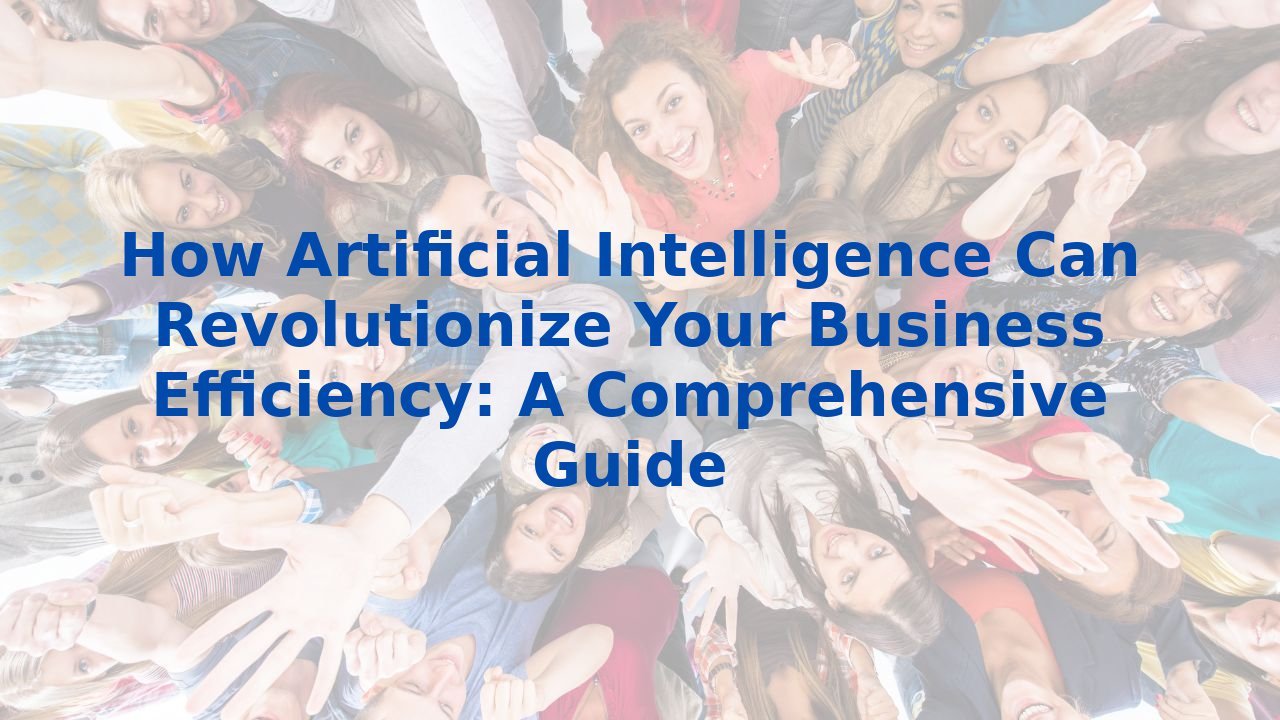How Artificial Intelligence Can Revolutionize Your Business Efficiency: A Comprehensive Guide

How Artificial Intelligence Can Revolutionize Your Business Efficiency: A Comprehensive Guide
In an era where efficiency is synonymous with success, organizations are increasingly turning to artificial intelligence (AI) as a game-changing solution. The ability to automate mundane tasks, draw actionable insights from vast datasets, and enhance customer experiences places AI at the forefront of operational enhancements. This guide explores how AI can elevate various business processes, ultimately propelling your organization toward greater efficiency.
1. Automating Routine Tasks
Imagine reclaiming countless hours spent on repetitive tasks. AI excels at automating these processes, allowing your team to redirect their energy toward more strategic endeavors. Functions like data entry, invoicing, scheduling, and even customer support can be effortlessly managed by AI systems. Benefits abound, including a decrease in human error and an overall acceleration in daily operations. By implementing AI-powered tools, organizations can streamline their workflows, ensuring that what once took hours can now be accomplished in minutes.
2. Data Analysis and Insights
The digital age generates an immense volume of data daily, often overwhelming for human analysts. Herein lies AI's strength: its remarkable capacity to process and analyze data swiftly and accurately. By uncovering hidden patterns and deriving insights, AI facilitates informed decision-making, targeted marketing strategies, and timely reactions to market shifts. With tailored data analysis, businesses can respond to evolving trends with agility, maintaining a competitive edge.
3. Personalized Customer Experience
Today's consumers expect tailored experiences, and AI equips businesses to meet this demand. By meticulously analyzing customer preferences and behaviors, organizations can deliver hyper-personalized recommendations and communications. The result? Enhanced customer satisfaction and unwavering loyalty. Leveraging AI for personalized experiences creates a meaningful connection between the brand and the consumer, fostering an ecosystem of engagement that stands out in a crowded marketplace.
4. Predictive Analytics
AI does not merely sift through data; it anticipates future trends. Utilizing historical data, predictive analytics offers insights into demand patterns, optimal inventory levels, and maintenance schedules. By adopting this forward-thinking approach, businesses can mitigate operational inefficiencies and ensure resources are allocated effectively. The promise of predictive analytics lies in its ability to transform raw data into actionable foresight, ushering in an era of preemptive decision-making.
5. Enhanced Marketing and Sales
With AI integrated into marketing and sales functions, organizations can access a wealth of data-driven insights. By understanding customer segments and behaviors, businesses can tailor marketing initiatives to target the right audience with precision. AI can also streamline sales processes by automating lead scoring, thus pinpointing high-value prospects. This intelligent application of AI not only optimizes marketing spend but also increases conversion rates, contributing to enhanced revenue growth.
Training Employees for AI
The benefits of AI stretch beyond technology; they require a cultural shift within your organization. Investing in complete AI training for employees ensures they are well-equipped to interact with AI tools. Understanding AI’s potential and limitations fosters an innovative mindset, encouraging teams to explore creative solutions across all departments. An organization that embraces AI literacy is one that is poised to innovate continuously, transforming obstacles into opportunities.
Future Trends in AI for Operational Efficiency
As we gaze into the horizon, the future of AI within business operations is bright. Here are a few trends to watch:
- Explainable AI (XAI): As AI systems evolve, there’s a growing demand for transparency. Businesses will favor solutions that clarify their decision-making processes, enhancing trust among users.
- AI for Sustainable Operations: Sustainability is no longer optional; it’s imperative. AI will play a pivotal role in optimizing resources, reducing waste, and driving sustainable practices.
- AI-Driven Continuous Improvement: The advent of machine learning promises a focus on continuous optimization. As systems scrutinize past performances, they autonomously seek out opportunities for enhancement, ensuring efficiency remains a dynamic pursuit.
Conclusion
In conclusion, adopting AI within your business processes is not merely a trend; it’s a strategic necessity. From automating daily tasks to forecasting future trends, AI offers organizations a treasure trove of efficiency benefits. Furthermore, investing in employee training solidifies the foundation for innovative application, fostering a culture that thrives on creativity and adaptability. As we embrace the boundless potential of AI, the journey toward operational excellence becomes a shared endeavor, one that positions organizations favorably in the ever-evolving digital landscape.